If, for some reason, you want to find a collection of posts from Australia, they're here.
Step one: make a Tinderbox agent. Step two: there is no step two.
If, for some reason, you want to find a collection of posts from Australia, they're here.
Step one: make a Tinderbox agent. Step two: there is no step two.
This is not Austria; there are kangaroos in Australia. Here are three (yes, three -- Hi, Joey!) of a mob we saw today at Serendip.

Kangaroos are sociable, but when they decide the party is over, they depart with elegance and grace. And when the kangaroos decide they'd like to jump over the fence, they don't even break stride. Just a little extra bounce to their step and they're over. Movies and zoos give you no idea.
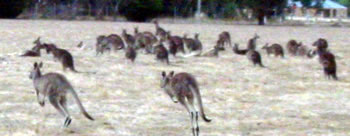
There were also some emus about. Emus are big, curious, and they aren't particularly worried about consequences. They're easily bored, though; this fellow had no interest in weblogs at all.

Later, in the Brisbane ranges, we found this sleepy fellow in a tree.

In fact, we met four koalas in various trees. All were drowsy, though one was clutching a tasty eucalyptus stalk just in case it wanted a midnight snack.
You've got to like the naturalist who decided this was the superb blue wren.
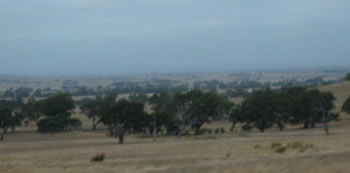
And so it's time to set the alarm clock; I rise at 5 (ouch!) and it's off to Boston for the night, and then to New Jersey where there are few roos.
Tinderblogger Dave Rogers recently took Winer, Searls, and Weinberger to task for fumbling a Chris Lydon question: "Who are the great weblog writers?"
In a way this is a tricky question. Neil Gaiman, for example, is proverbially better than anyone who writes faster, and writes faster than anyone who is better. He has a fine weblog. I'm not sure, though, that the writing in his weblog is so wonderful I'd single it out.
In terms of shaping the medium, Winer himself has been tremendously influential. You can trace lots of stylistic details in lots of weblogs back to Winer. But Dave's a pundit and a system-maker and a force of nature and he's always been there; it's hard to look just at the writing.
That's one reason the question's tricky: lots of well-written weblogs are quietly and almost incidentally well written.
Offhand, I think of three weblogs where the writing just makes the weblog. One has been Alwin Hawkins, whose thrilling tales of nursing will, one hopes, continue in his new deskbound role. One is Nick Tyler: you seldom know what Nick is talking about, exactly, other than that she's much too young and the whole thing was probably doomed from the start, but it's always quite a ride. And Diane Greco, when she wants to, can spin a yarn in a unique but completely idiomatic weblog style.
But then there are people like Jill and Kathryn and Josh who usually don't seem to write beyond clarity, brevity, and sincerity, but we all know that writing simply is not simple. And then there are radicals like Adrian, the vloger.
And then there are the 4,999,700 or so blogs I haven't even glanced at, and all the wonderful writers I haven't thought of tonight because I'm tired and full of lovely Yarra Valley Viognier.
It's really important to make sure we can glance at the other 5 million blogs when we want to. Adding one or two additional regular readers to every blog in the Long Tail makes a huge difference in the economy of the blogosphere: if everyone gets that reader or two, then most of the weblog reading that happens will happen in the Tail and the Tail will matter. If people don't generally get that extra reader or two, then all the reading is concentrated in the A List and, well, it'll be Mr. Murdoch and his five best friends, all the way down.
I argued at Blogtalk Downunder that it's OK if only your mother reads your weblog: it's good to write to your mother. Attention, mothers: reading your kid's weblog is good for your kids, and also good for the ecology of the blogosphere.
For a late dinner tonight, I had a plate of prosciutto with slivers of fresh figs, crumbled bleu cheese, and some rocket. This is a nice combination, one I'd like to remember for guests since it doesn't require a ton of last-minute prep and would work either before or after a meat or a fish course.
Yesterday we stopped at a bakery that offered fresh duck eggs at very moderate prices. Today, I tried a Thai duck omelet with red-cooked pork, baby corn, etc with a nice Yarra Valley Viognier from one of the vineyards through which we drove in yesterdays day of birds and grapes.

Written with lyrical grace and a sound sense of place, The Quarry is a glorious failure. On a lonely stretch of African road, a missionary minister stops to pick up a hitchhiker. The minister, though out of place, is not without insight; he knows the hitchhiker is even more out of place than he. Mayhem ensues.
Where this fine confection collapses, alas, is that it boils down to a chase. A good chase is extraordinarily difficult to write, right now, because we all have seen so many lavishly-produced, lovingly-directed cinematic chases.
Up the Yarrah for birds, and down again for wine. Very tasty wine indeed, especially at Punt Road.
In a word, wow.
Below, there's a nice picture of some nice cockies.

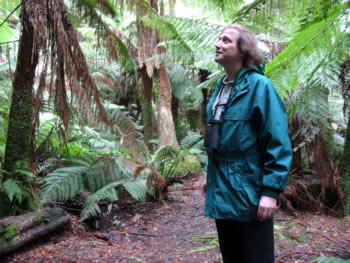
An old friend from Boston has gone Australian, and explained cockies and stubbies and pokies thus:
Q: Does the fact that a guy shortens lots of nouns to two syllables with a diminutive mean he is out and proud?
A: Nope, they all do it: Chrissie, pressie, barbie, brekkie, bickie, cuppa, rellies, schoolies and of course Aussie. "Arvo" for afternoon is the one that gave me the most trouble because it DOESN'T FOLLOW THE PATTERN) ... ooops, started to rant a bit there ...
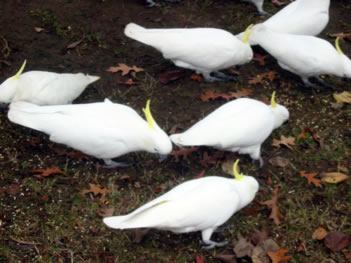
Adrian knew there was a Superb Lyrebird somewhere nearby, but we couldn't find him. No worries.
Turnbull is smart and observant. She writes clean prose, and for much of the book manages to avoid cliché. Towards the end, we have a series of rote chapters on Peculiar French Affections -- couture, cuisine, poodles; these would have been better left out, but I'm inclined to assume that someone made Turnbull add them in the first place.
There's not enough, really, about her Australian-ness. That's the point, really: it's not just An American in Paris, because that's been done, and it's not just A Nice Girl In Paris, because that's been done too. It's this, specific Aussie in Paris that we're here to see, and sometimes she's so shy and modest that she leaves out key bits. She flies to Paris (from Bucharest where she's trying to be a Young Journalist) to meet a man she hardly knows, a man whom she is eventually going to marry. When do the sparks fly? She never gives us a hint! Somehow, they got from "you must visit me in Paris sometime" to sharing a bed and a terrier and a mortgage; we ought to have a clue.
Is this reticence Australian? Or just Turnbull? Or her editor? The cliche of falling in love in the streets of the 4e arrondissement might have scared her off, but the cliche of 'my first fashion show' didn't.
What we're missing here are the intimate, unexpected notes that teach us about personal and national character. We don't need interesting revalations from the boudoir, but if it's a book about being young and Australian in Paris, it might be nice to have more youth and tucker and a little less schtick about her adorable little dog.
The big art museums in both Sydney and Melbourne are big, and both have vast, flexible, and impressive spaces. These are museums with lots of space, space they often use extravagantly. Compared to Boston's MFA, which has far too few rooms and far too few walls, it's an emphatic statement. (The Centre Pompidou has the same effect. Neither the Tate Modern nor the d'Orsay feel extravagant in this way, though they're built in vast industrial spaces)
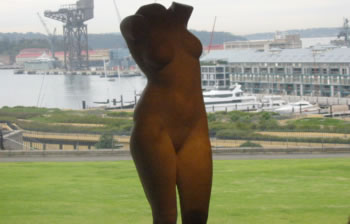
All the modern museums seem to enjoy this gesture of showing you the city in its own frame. Most architects set it off behind a partition; Sydney integrates it rather nicely. Australian museums are also the masters of very dim, dramatic lighting as here, and even more so in the Melbourne exhibit of Bill Henson's lusciously dark, monumental color photographs.
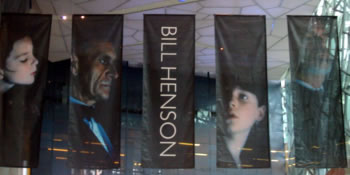
Still more belated Blogtalk talk, as AntiPopper (Ben Ho) chimes in on day 2.
Mark also just broke my head open with the observation that content aggregation, whether it be via RSS or whatever, is fundamentally unable to capture the meaning that lies in between texts. A possibly obvious point, but when posed in the current context, this points in a really interesting direction for my research project. Oh, and another bite of his, about authenticity: 'nobody’s who they say they are'.
Diane Greco thinks (27 May) I slighted writers in Pomp. And, reading her refutation, I'm inclined to agree that she's right and I'm wrong.
But novels and stories have structural requirements -- and these are notes, so to speak, that must be hit in order for the piece to succeed at whatever it is supposed to do (according to expectations defined by the artist or the audience or tradition or whatever). For instance, in my novel, I know the first fifty pages must set out, in miniature, the moral universe of the book, and that there must be thirty really stellar pages just past the midpoint, where the moral crisis prefigured in the first big chunk must be resolved on pitch.
If I were to mount a defense (and it does, admittedly, smack of 'If it will appease her sorrow,/ I'll marry this lady today,/ And I'll marry the other tomorrow! "), I think it might be along these lines. Dan Brown is obviously a professional writer; The Da Vinci Code is a best-seller everywhere, it's spawned admiration and emulation and explication. He may not be a good professional, but Deivi Cruz isn't a good shortstop and nobody says he's not starting for the Cubs and therefore a pro. Unfortunately.
But back to the point, such as it is. In terms of pure craft, the Da Vinci Code is not impressive. Characters are inserted for patently formal reasons. They do things to advance the plot without motivation, and they decide to be bribed or unobservant whenever their natural behavior would obstruct the thrilling chase. There are so many buckets of exposition that we need an entire subplot to justify a second explicator.
This is not, to my mind, a genre issue. John LeCarre doesn't have these problems; he generally hits the notes. So does Patrick O'Brian. So, for that matter, does Stephen King. King wrote Carrie perched on a card table in his spare time; I think the Kings were living in a trailer at that point, and he got the idea from either being or talking to a school janitor. (Can't check the details, I'm on the far side of the world. Sorry.)
But, in the end, Diane is right.
After the talk, we went and had lovely plates of dumplings. These were not quite as good as the crystal dumplings in Singapore, but very tasty indeed.
Then, walking back toward the art museum (late afternoon was spent in the Australian galleries), I came across half-price tickets to tonight's performance of Pinafore and Trial By Jury by Opera Australia. It's terrific to see these performed so well. Almost all the Gilbert and Sullivan I see is amateur -- often very talented and extremely well-rehearsed amateur, but amateur nonetheless. Now, we've been talking a lot about the pros and the amateurs lately, and in writing I'm not sure I see much difference. In Gilbert and Sullivan, though, I have to admit it matters:
I don't know if it was the hearing aids or the hall or the company, but the performance was loud -- even back in row P. Again, if you aren't worried about hitting your marks and hitting your notes, you can really stand up and speak out.
When I give talks, I try to string together several themes -- some mostly in the visuals, others mostly in the script. My interests tend to fall between fields and my voice can sound odd, so threading themes together helps make sure that some of the people are amused at least some of the time.
The danger of multi-threaded talks, of course, is incoherence, and I think the RMIT talk strayed well into the neutral zone and perhaps beyond. Segues that looked fine on paper, earlier in the week, seemed impossible on stage. The audience was attentive and altogether gratifying, but perhaps it's because Australians are naturally that way.
One point I made in the talk that I haven't mentioned here, and should, is a surprising observation about prototype inheritance in Tinderbox. Early Tinderbox sketches had classes, not prototype, and we worried a lot that people would hate inheritance. Students, for example, notoriously find the notion of classes hard to master; being able to inherit from any object strikes computer scientists as wild and crazy but ought, in principle, to avoid this issue.
For whatever it's worth, though, Tinderbox users tend to make separate prototype objects rather than inheriting values from instances. While Tinderbox will let you say, "this note about War and Peace can stand as the prototype for all my bibliographic references", people tend to make a new note called "Books" or "protoBook" or something like that.
I do, too. But I don't think it's my influence at work; certainly, lots of people use Tinderbox in ways I don't!
So, prototype inheritance hasn't worked the way we expected. In some ways, perhaps, it's worked better than expected. But lots of people have discussed various inheritance systems and Tinderbox is probably one of the first applications of prototype inheritance in a context that doesn't expect you to have studied a few years of undergraduate computer science.
Movida, a Melbourne tapas place, is very hot. Adrian and I couldn't get in the other night. I had a 7:30 curtain and thought, "I really shouldn't skip dinner entirely", so I went way early and had a very nice scallop, in its shell, with a bit of tasty ham and a spritz of potato foam with my Hewitson "Miss Harry" shiraz/ grenache/ mouvedre. Not the equal of the dayboat scallop of legend, but good.
Then I tried a little smoked pepper filled with swimmer crab and potato, deep fried, with some mayonnaise. Nice texture, looks lovely, a bit bland.
The hostess asked if I were still peckish. I didn't think anyone had said "peckish" in generations, not unless they were in costume, so I perhaps I was or ought to be and, after a brief discussion, settled on some potatoes a la pobre, with olive oil, peppers, garlic, bay leaf, a little herb. I'm pretty sure they made this to order, which seems extravagant. I didn't mind the time, but I'm taking up space at the bar and though it's only 6:30 they're already pretty well packed.
Leigh Blackall has some good thoughts about Blogtalk and especially about ethical blogging and the ecology of the long tail.
. I think Mark perhaps emphasized the liability in comments too much, and thus distracted the audience’s ability to fully comprehend what he was saying. I felt that it is not so much because of the liability in comments that comments should be turned off, but because the network is strengthened if an ethic of commenting is practiced in the true monologue style of blogging.
Sometimes when traveling, Linda thinks I undertake a little too much.
Woke early this morning (with residual jet lag) to the pleasing discovery that the hotel, despite somewhat dreary decoration, has free wifi. Dispatched email, with tentative dinner plans and various bits of business, chiefly a response to a strangely unpleasant email from a graduate student at a Southern US university who suggested charmingly that our software wasn't "user-friendly" and didn't look very good and could he please have a discount?
Off in good time, for Victoria Market where I strolled many aisles of vegetables, fruits, meats, delicatessen, organic everything, baked stuff, etc. Ate some lovely hot donuts from a truck, then drank some flat white from a cafe.

After this, I ambled across Melbourne to the National Gallery of Victoria, stopping along the way to pick up a theater ticket for the night as dinner plans showed some signs of collapsing. The National Gallery has magnificent design exhibit with all the classic chairs: Barcelona, Corbusier, Breuer, and even a Rietveld which I'd only seen in books.
They also had a Frank Lloyd Wright office chair from the Larkin building, which a design student was earnestly sketching; amazing how Wright can take a conventional swivel desk chair and make it a Wright. Usually, Wright also made chairs uncomfortable, but since office chairs adjust, this one is probably safe.
The collection of 19th century academic paintings are fantastic, and almost unashamed.
Outside, I watched the parade for National Sorry Day, which is today. Then, on by tram to St. Kilda's, which appears to approximate Santa Cruz as seen in a mirror. The Esplanade was chilly, but Acland street was amusing. Cosmos books was very good indeed, right down to the sales rep pitching the next batch of design books to the buyers right in the middle of the shop floor.
Lunch at Cicciolina, which even in mid-afternoon was full of chattering groups, mostly young women who lunch. I had a souffle of swimmer crab, which was lovely, and then a single big oxtail raviolo sitting atop a handful of beautifully seared scallops, atop sauteed rainbow chard. There was a little bacon in the sauce, I think, verjuice, and beurre blanc. You wouldn't think this would work -- oxtail and scallops? But it does.
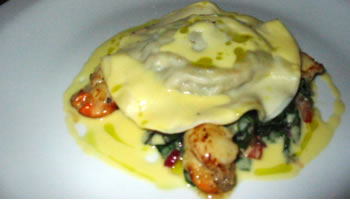
Tasty strudel at one of the East European cake shops for which Acland steet is famous, and then back to Federation Square, spending a few minutes with an elaborate digital storytelling exhibit that tends to confirm my perception of the strengths and weaknesses of orthodox Digital Storytelling. Oddly, I hadn't heard of this exhibit before, and it doesn't make any obvious reference to the Atchley/Lambert/Mullins crowd, but the stories seem completely according to Bootcamp rules. Parallel evolution?
Then rush back to the hotel to change and review tomorrow's talk, and then off to the Arts Centre Playhouse for Wars of the Roses, a marathon (3hr 45 min) but thrilling adaptation of the Henry VI trilogy in very modern dress. Letting the French have blue hair was a stroke of genius. Joan of Arc (Georgia Adamson) is played brilliantly as a sexy Jedi knight, and since the Duke of Burgundy is played by Julia Davis, this makes Joan's negotiation with Burgundy into an edgy dance of seduction. The performance ends with Richard, duke of Gloucester performing "Now is the winter of our discontent" as a rock ballad. Director John Bell is a wild fellow.
And so to bed.
Lovely little Tinderbox dinner last night at Finger Wharf, featuring Moreton Bay Bugs, a small crustacean of the lobster persuasion, and a very nice lightly-smoked ocean trout.
Oh yes, and a really nice d'Arenberg Shiraz-Grenache blend that Megan Heyward, author of the imminently-forthcoming Of Day Of Night, selected. Great to meet Tinderboxers Eric Scheid and David Phillips, too.
It's amazing, when you think about it, to travel to the far side of the world and dine with people with whom you've carried on an extensive correspondence. Though Sidneysiders seem to have a knack for going everywhere and knowing everyone; a cab driver yesterday was telling me about his friend in Marblehead, a newspaperwoman.
There's a big exhibit at the Gallery of New South Wales for the Archibald Prize, a major annual award for the best Australian portrait. It's been awarded for eons, it was once the subject of a famous lawsuit, and it's spawned a number of additional awards -- the Wynne Prize for landscapes, the Sulman Prize, and the Australian Photographic Portrait Prize.
One of the finalists for the photography prize, Kelley Munce, wrote that she used a Kodak point-and-shoot but that she just bought an EOS 20D and hopes to have a business up and running soon. So, she's not an amateur. But she's also not a pro, in the sense that she's using tools that amateurs normally use and she's not writing artist statements in the voice professionals normally adopt.
The point isn't whether bloggers are amateurs or whether journalists are pros. (Journalism is not a profession, incidentally. Rupert Murdoch hires you to write for one of his papers, >poof< you're a journalist. Rupert Murdoch can't make you a physician or admit you to the bar.)
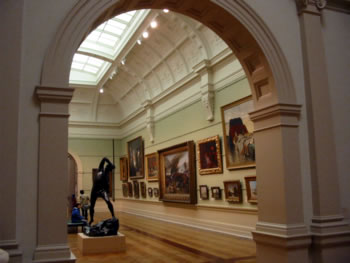
Yesterday, I caught a train for Blackheath, a small town in the Blue Mountains just east of Sydney. As I understand it, the East coast of Australia backs promptly into these craggy, tropical, and nearly-impassible mountains, and from then on west it's all pretty flat.

There's an impressive national park here, and I spent a delightful day trecking here and there, looking at mountains and waterfalls and birds and getting some very sore muscles.

Afterward, I asked a very nice and helpful ranger for assistance with some ids. She convinced me that the abundant birds that look like Yellow Rumped Warblers with big, downcurved beaks are really wattlebirds. But I saw a Red Wattlebird in a garden on the way back to the train, and it's a big bird -- easily three times the size of my talkative little flycatching acrobats. My best guess is New Holland Honeyeater.
The odd gum tree seems pretty impressive. A whole forest of gum trees, well, there you are. I understand that banksia is common where I was walking, but I'm not at all sure what a banksia is to its friends.
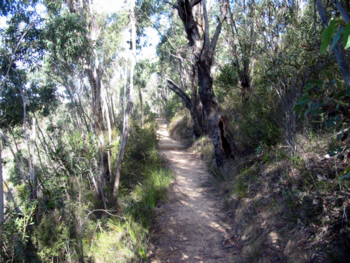
After quite a few miles of the cliff to trail -- the cliff in question having a strong tendency to indulge in very precipitous rises and ravines -- I had a nifty lamb pie at Gardiner's in Blackheath, waiting for the train, and a coupel of schooners of beer. I should learn about meat pies; it could be a very useful genre.
During the conference, Rebecca Blood made some very interesting points about the parallel between weblogs and other important activities pursued by experts without the customary credentials. The Audobon Christmas Bird Count is one example, amateur astrononmy another. As higher education becomes more concerned with bestowing credentials rather than expertise, the knowledge network routes around the outage. (Rebecca and I engaged in a little street-theatrical sword crossing on whether the blogosphere is fragile and requires conservation, but I believe we're pretty much in agreement on the core idea.)
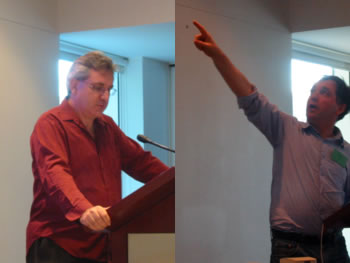
I'm also highly intrigued by Adrian Miles' work with video weblogs. He's got a crucial point about the way the meaning of your blog depends on what you link to, and who links to you: weblogs talk to each other. (My anti-comment stance, in this view, boils down to: 'Let your weblogs talk to each other; don't short-circuit the conversation between weblogs with comments because they get the context wrong and inspire conflict and unhappiness. [BlogtalkDownunder]
Australian Ibis. Cockatiel Sulfur-crested Cockatoo. Rainbow Lorikeet. Pied Currawong. Crested Pigeon. Noisy Miner. In the city park!
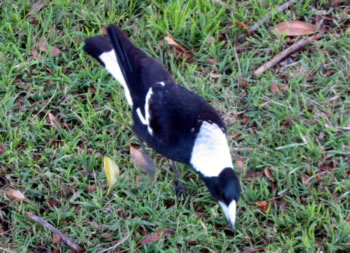
Of course, I may be way wrong; everything is new, including the field guide. I had a terrible time with the crested pigeon -- think fat titmouse; I tried raptors, I tried parrots, I tried finches, before I remembered that outside New England there are some interesting pigeons. And I'm not entirely happy with the ID of the Miner, but I got a terrific long look and it seems plausible.
My goodness, but cockatoos are loud!
Simon Ng, a New York college student, was murdered earlier this month. His sister's ex-boyfriend, Jin Cheng Lin, has been arrested; Simon blogged shortly before his death that Lin wouldn't leave. Thanks, Elin.
I told him to wait downstair while I get them for him. While I was searching them, he is already in the house. He is still here right now, smoking, walking all around the house with his shoes on which btw I just washed the floor 2 days ago! Hopefully he will leave soon, oh yeah working on the jap report as we speak!
My Blogtalk Downunder talk, which ran to some 78 slides, tried to argue that today's blogosphere needs to be protected, appreciated, and cultivated lest we accidentally ruin it.
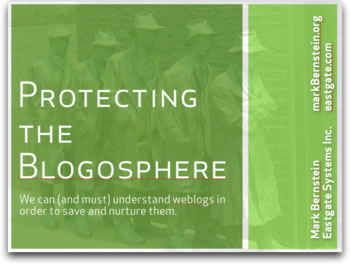
In particular, bloggers need to understand that discovering and linking to a new, little-known weblog is an especially fine thing to do, while repeatedly linking to the A List may be actively harmful. Providing fresh lists -- what you're reading, what you'd like to see, where you plan to go -- is a gift to the Web. So is hard work and finely crafted writing. Sloppiness and second-rate thinking, on the other hand, does damage.
Michael Specht's notes are online. Adrian Miles, too.
Update: Gavin Sade:
The conference opened today with an inspiring presentation by Mark Bernstein. A podcast of his presentation is hosted on the conference blog. The central argument of the presentation was that the long tail matters, and it the long tail where the life is...
I repeated my Blogtalk II argument against comments -- it was one slide of seventy-eight -- and that one slide launched a lot of discussion.
The great thing about Blogtalk is the tremendous range of applications, Motivating students in Singapore to learn Chinese. Motivating governments to understand indigenous communities. Support communities for people who have miscarried. Writing in refugee communities -- including an intriguing critique of Digital Storytelling vis-a-vis weblogs. The Christmas Bird Count. [blogtalkdownunder]
Watertown, home of Eastgate Systems, has a blog. I discovered it today, from Sydney Australia.
H2otown happens to be home to the creators of one of the most interesting pieces of blog software ever written -- a system called Tinderbox.
Alwin Hawkins has a great piece about balance in the workplace.
Look, I appreciate how bad you feel. But try to understand, I was a critical care nurse. I've had patients die in my arms, and brought them back to life. I've had cooling corpses sit bold upright in bed as I was getting them ready for the morgue. I've had patients try to kill me."
Sorry, but splashing a bit of hot coffee on the floor in front of me doesn't bother me.
Andrew Bartlett is a senator in Australia. He has a weblog. He's giving a talk about the impact of weblogs on politics and politicians, and usefully distinguishes "real" weblogs from various kinds of simulated weblogs.
Weblogs are meant to be personal. The 'campaign diaries' so many politicians are publishing are lame.
One of his main points is the importance of not breaking the political blogosphere into separate left-wing and right-wing domains -- subsets that tend to agree and reinforce each other. This may be increasingly difficult in the US, in which polarization seems to be approaching a level of bitterness not seen since Reconstruction.
At Blogtalk, Rebecca Blood makes a very interesting argument that weblogs are just one aspect of an increasing shift toward citizen science and, more broadly, toward broad participation in research that meets the highest standards. She calls these "professional" standards, but clearly we simply mean the best standards -- not the standards of the profession.
The audience here is oddly skeptical, from the tone of the questions. It seems clear to me.... (Both Blood and, earlier, Jenny Weight hold out lots of hope for the semantic web as a solution to the limitations of tools like Technorati.)
Robert Ackland did an interesting study of the linking behavior of American A-List political weblogs. He found that conservatives link to each other; liberals link all over the place.
That gives conservatives a little more google juice, and that's worrying. But it's also what you'd expect from first principles: American conservatism has always been embattled and often anti-intellectual, while the defining characteristic of Liberalism is the possession of liberal interests.
Blogtalk Downunder is under way, and struggling with really bad A/V problems. We're spoiled; this used to happen all the time, but in the last year or so, it seems that projectors have simply worked.
Makes me nervous, because I've got a 70-slide high-wire act. Things will work out.
Setting up my notes for Blogtalk Downunder, I made a fresh Tinderbox document with a few handy prototypes. Because I might want to show this to people, I wanted the document to look nice -- and to be easy to read. So, I set the map font to Copperplate Gothic, and I modified the color scheme with a few samples from yesterday's snapshot of the opera house.
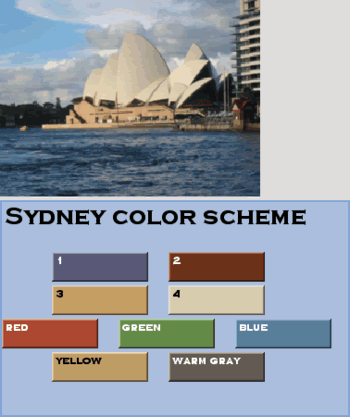
Recently, I read a color theory article in the graphic design space that proposed, when you're stuck, just grab some colors from a photograph.
One fun thing about Tinderbox: you can redefine what sort of red that "Red" is.
The bird books are different. The helpful bookseller doesn't know which is best, but know which one sells. I have Slater. I hope it's the right one.

The trees are different, too. The coffee is different. A caf e crême is, more or less, a flat white. In Boston, flat white is a wall paint.

Lichen lived with her mother and father and brothers at the edge of the woods on the shore of a large, quiet arm of the ocean. The woods sheltered them, the water fed them, and small electronic devices told them stories. They lived as comfortably as anyone could.
From Eileen Gun, "Lichen and Rock", Stable Strategies and Others.
I left LA in the middle of the night, slept well on the plane, and arrived at Sydney the next morning. Well, the next next morning, thanks to the dateline.
And sleeping so well might not have been a good idea, because eight hours of sleep early on the 14 hour flight left me with plenty of jet lag time. For some reason, I think I'm going to have ferocious jetlag.

But there's Sydney Harbor out there, somewhere. The birds are all strange -- what's Australian for Peterson's? Or breakfast?
Tomorrow: Blogtalk Downunder!
Scott Price continues his tutorial series, remaking the Simplicity Tinderbox template to use Cascading Style Sheets.
Yes, it's coming along. I think we're at the edge of seeing the dam break.
Yes, I know it's later than you'd like. Later than I'd like, too.
Soon!
From time to time, people need me to send them a CV. I don't need one much, so mine's always gathering dust. (To get a visa a few years back, I had to send a complete publication list to an Asian Government, which meant I had to phone people I haven't seen in decades and ask them if they could remember what papers I wrote in grad school. Oy.)
Stuck at Logan for a couple of hours and wanting to test some new Tinderbox features, I put together this CV in Tinderbox. Nothing fancy -- each publication and talk is a note, and we've got simple templates for exporting sections, notes, and the whole shebang.
It's very likely got mistakes, and there are doubtless omissions. I'm sure I'm missing some early publications. I also rediscovered some forgotten friends, such as Chasing Our Tails.
Tinderbox 2.4.1 is out now. Macros are lots faster, and quite a few rough edges have been polished.
Work continues unabated on Tinderbox for Windows.
We'll always have Paris. Anja Rau blogs Tinderbox Weekend Paris a little late, but (as usual) with an interesting angle.
This is new: I'm starting to meet people in Germany who have at least heard about Tinderbox (and Mac-users to boot). Allegedly, 'everyone knows that Tinderbox is the best tool for concept developers - only no-one has used it yet'. What's keeping them?
J. Nathan Matias takes a long look at whether students should blog anonymously or pseudonymously, or not worry about their permanent record.
Richard Chamberlain has built a Tinderbox aggregator at http://tinderbox.SunsetAndLabrea.com/ . It collects fresh posts from people who often write about Tinderbox.
One day in Boston, and then off to Sydney for Blogtalk Downunder. The full program now online. Lots of exciting papers, including a just-posted Adrian Miles hypertext on why video in a blog is not the same as a video blog. (It's made with Tinderbox.)
I'll be speaking first thing Saturday morning -- day two of Blogtalk. There's a Blogwalk scheduled for Sunday, too; if you're interested, contact the organizers and ask for an invitation.
I'll be in Sydney for a week -- plenty of time to get together if you're in the neighborhood. Then it's on to Melbourne, where I'll be doing a talk at RMIT on Friday. (I think it's open to outsiders)
More on those fascinating Max Klinger etchings I saw in Salzburg:
A nifty new project: A Tinderbox Reference File is a Tinderbox document and a Web site (exported from that Tinderbox document, naturally) about Tinderbox.
Here's an interesting discussion in a church blog on the subject of allowing comments.
Comments give us flames, trolls, comment spam. Imagine: if the left took some of the hours and hours of work they spent last October fighting comment spam and trolls on Atrios and DailyKos, and spent maybe a tenth of those hours canvassing Ohio and Florida.
Moral of the Great Weblog Comment Experiment: comments build traffic, but not traffic you want or you can use. Link liberally to other weblogs -- including those that disagree with you -- but let your opponents publish in their own space.
This weekend, we had the big planning meeting for Hypertext '05. The conference will be in Salzburg, Austria, this September.
Salzburg is quite a delightful town, a tourist mecca since the days of the grand tour. Some nice food. Lots of excellent beer. The conference will be in a very pleasant hotel, a short walk from the Old Town. It's the place to keep up with research on hypertext -- meaning research on links. I think we're going to have a panel on blogging, maybe also a workshop. Stay tuned.
The big trend I sense in the program -- and, even more, in discussions about the program -- is fresh interest in stretchtext and collage and other ways to connect things together beside the familiar Web link. This ties interestingly into the some new Web trends, especially AJAX. I think there's a very intriguing Tinderbox connection here, too. (For example, how might the little rollover-links like this be used for discursive hypertext? For fiction?)
This sort of javascript play used to be a lot of trouble for scant reward -- especially since you'd constantly be running into incompatible browsers and your pages would keep breaking all the time. Now that the Web Standards folk have won, I think it's time for a fresh look at stretchtext on the Web.
Especially since Tinderbox templates and macros should be able to make this very, very easy.
Update: Not that easy, apparently; Safari and Firefox disagree about whether OnMouseOut applies if the button moves away from the mouse. Fixed now. Thanks, Oliver Boermans!
Jon Buscall has a long, nuanced discussion about blogging and business. It's not just a question of bribing bloggers to talk about you, or trotting out an advocacy blog; blogging takes touch.
I suppose you could pay someone to blog about a product on a regular basis, but for this to work the writer would also have to let their personality shine through: those book /film/software reviews, coffee house recommendations and sketches of Paris are just as important as blogging staying 'on topic'. For example, a pure Tinderbox is Fabulous-blog could not be as nuanced as a a personal blog like Doug or Mark or Scott’s without all the other stuff. Seeing something of a bloggar’s world gives their software recommendations better currency. The unspoken stuff is important.
I don't know that the unspoken stuff is important, but the big picture certainly matters. Staying on message is for politicians.
Beth Young has recently switch to Macintosh, and writes an amusing ode to the Powerbook. The conclusion:
I've already bought some new software that's only available for Mac: Tinderbox. Pretty soon, I'll be one of those artsy creative types with bare feet and a beret.
An interesting thing about the Munich rail station is that the food at the food court is actually appealing. Singapore manages this too, but Singapore's climate makes for a long tradition of outdoor food. And the news isn't the bratwurst, but the roll. (Why my local pizza joint doesn't try to make decent bread beats me. There must be a reason.)

The train trip to Salzburg is pleasant, smooth, and just the right length. 90 minutes gives you time to settle, read, and watch the scenery, without making the trip seem like an epic. You round a bend and, suddenly, you're in the Alps.

My first impression of Salzburg is that it's Durango, Colorado, with history. It's nestled snugly against craggy foothills. It's got lots of gift shops that sell kitsch (but I guess this is the part of the world that invented kitsch and so they're entitled) and the luxury fashion chains you see everywhere from Paris to Peru, and also some intriguing things. (They buy kitsch, you buy clever camp, and I buy bottles of artisanal vinegar from the flask -- apple, strawberry, and balsamico di modena). Of course there's also lots of history in Salzburg. Mozart, and modern.

It looks like there's a lot of food in Salzburg, too; it's been a tourist town for a very long time. Some things are the same everywhere, except in Salzburg, when you have the pre-dinner staff briefing before family meal, you can do it in the square.
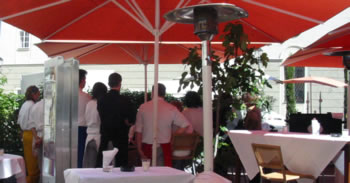
Hypertext '05 happens just after the end of the Salzburg Festival. We're here before the Festival really kicks off, and anyway I have no time to play hooky for concerts. But I saw posters for the Goldberg Variations tomorrow, Jesu Meine Freude (which I've never heard in concert) on Sunday, and several other delights.
I caught the Museum der Moderne on the wrong day, right between exhibits. But they let me see the etchings of Max Klinger (1957-1920) anyway. I don't think I'd ever heard of him, to be honest, but they're brilliant: strange visual narratives of sex and disaster. There's a six panel Eva und di Zukunft (Eve and the Future) that alternates Eden and Prophecy; he draws the Temptation was the serpent holding a mirror so Eve can see how good she looks with the apple, and he draws the Expulsion with Eve carrying a clingy, useless (but bulky) Adam out of the garden, as an tiny angel guards the gates behind her. The album I really admire, though, is Drama (1882), which starts out In Flagrante and leads through shame, motherhood, the death of children, and the failure of revolutionary dreams. All of this is in a very, very dark key -- about as dark as etchings get -- but it's also very tonal and very precisely drafted. Terrific. I think it might still be here in September, too.
Tonight, we begin planning the Hypertext '05 Program.
David Allen says reminds us that you can Get Things Done with Macs. Someone should tell them about Tinderbox....
Cautioned by Diane's 11-day weekend in London, I tried to ease the start of this travel fracas by taking the morning flight to London instead of the customary overnight jaunt. Boston is farther east than you think, so it's hard to get much sleep before you land at Heathrow.
That worked out well. I got lots of work done on the plane. I did some reading, too, and even had time to watch a movie. And, even though my connecting flight left early in the morning, I had six hours of sleep in a (fairly) comfortable bed instead of a bouncing plane.

Then, on to Munich. The flight was easy. The trip into town was slightly complicated by puzzlement over whether you took the train going right-to-left, or the one going left-to-right. It turns out, either train works fine. This is the Chicago Loop, writ large. Go Munich!
Dropped bags at the hotel, then charged off to the Neue Pinakothek because the day was already getting late. I even (uncharacteristically, especially when I'm travelling alone) splurged on a taxi.

But, arriving in good time, I realized I was famished. As I'd last eaten somewhere over Greenland, that wasn't too absurd. Dashed to the nearby Brasserie Tresznjewski for a bowl of really excellent fennel soup, and a very nice plate of Schinkennudeln.

The Neue Pinakothek isn't embarrassed about 19th century art, which is on the whole a good thing. There's even an entire gallery of art that really didn't make it -- things in the original collection that have been tidied away ever since.
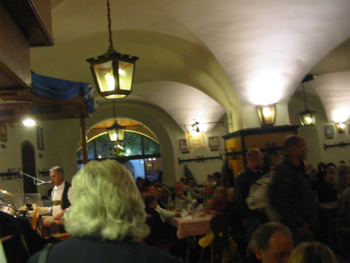
Eventually, I wound up at the Hofbräuhaus. First time in Munich; if you never do tourist things, well, you never get there. I asked for a small dark beer, which turns out to be a liter. I bought a huge soft pretzel from a pretzel girl in a drindl. Who can resist the chance to have a pretzel on the Platzl?

Meanwhile, I'm sitting at the very back of this huge room, filled with long, shared tables and filled with a German brass band doing the oomp-pah! thing. Good beer, too.
Eventually the tables fill even further. A couple of German guys get their liters, and then a nice older couple from the US sit down. They're revisiting the Bavarian town where she spent some time after college. He used to be a philosopher before becoming and indexer; we talk about Europe and MS and political correctness.
Note to audiologist: the restaurant program on my new hearing aids is good. I'm actually coping in a beer hall, with a crowd and a band.
Lilia Efimova observes that the War that's being commemorated on the TV is not quite the war the Russians remember.
Some of this, of course, is dealing with Stalin.
But Americans (and, I think, lots of Western Europeans) tend to forget how central the Soviets were to winning the war. They won; we helped.
Could we have done it without the Soviets? Maybe. Fortunately, we didn't have to find out.
Kevin Kelley's Cool Tools recommends Parafilm for closing bottles. Now that's a name I haven't heard in many years!
That reminds me: I've always wanted to get some useful glassware for the kitchen. A couple of graduated cylinders would be really nice. A set of beakers. And I bet a 250ml Erlenmeyer would be handy for holding juices and sauces. And, yes, a roll of parafilm to seal them all.
Vlad Spears talks about using Tinderbox to blog when you're not connected to the net. This is a very useful point, especially when you're on the road -- as I'll be starting tomorrow.
We often think that server-side tools (Blogger, WordPress) are good on the road, because you can use them from a borrowed machine or a random cafe. That's true. But client-side Tinderbox lets you write it down when you're in the wilderness or on the plane. You can edit, too -- and that can be almost as important as writing stuff down in the first place.
On the Tinderbox Wiki, Dave Garbutt describes a clever, ultra-simple Tinderbox technique.
He's got a large project management journal that includes, among other things, a host of questions about his client's needs and equipment. Naturally, these questions appear in the Tinderbox -- and, naturally, the titles are questions.
Garbutt simply makes an agent that looks for notes those name contains a question mark '?', and sorts those notes in outline order. The result: a handy, up-to-date list of all the questions he might need to ask a new client before getting down to work.
Spring is in the air. Steve Ersinghaus says nice things about email responsiveness and Eastgate's lack of voicemail mazes.
This is, of course, a complex question. I hate to leave email sitting around for hours if I can avoid it, and I hate to leave questions and bugs sitting any longer than I must. And I try to encourage my colleagues to feel the same way -- not because I'm right, but because it's probably better if Eastgate is consistent.
But there are costs, too. One worry is that, when I'm on the road (like I'll be in the coming weeks) and the office is shorthanded, we're bound to be slower than usual. Unavoidable, but bad.
Tonight for a send-off dinner, I'm trying Gordon Hamersley's roast chicken with lemon and garlic. It's a bit of a production: its sauce is based on double chicken stock, so it's a two-weekend adventure. So far so good; I'll try to let you know how it works out.
Note added in proof: pretty good. The small organic chickens (raised respectfully in California and Vermont, respectively) worked well, the sauce was worth the work. Not at flavorful as at the Bistro, but not bad at all.
Last night I made some duck confit, because it's tasty and because it'll be handy for Linda while I'm away. When I make confit, I always pour off and save the duck fat, because a little duck fat is much better than vegetable oil for cooking potatoes. (Sally Schneider has this one nailed: treat fats as if they were really, really expensive. Want to fry your potatoes in less fat? Use only the fat you get from your roast duck. Running out? Wait for the next duck!)
Question: when I chill the duck fat, I get another layer of water solubles, like a dark stock. Is this good to save? How should I be using it?
Answer: from eGullet, the consensus is that the water soluble layer is tasty, though it tends to be salty. Add it to soups and sauces.
I think weblogs should offer lists of ambient information: books you're reading, movies you're seeing, food you're enjoying, places you're going, mountains you're climbing.
These lists are interesting to readers. They may be useful to web applications and consolidators. They are also powerful ways for the writer to think about what they're doing and to reflect on how they're spending their time and their energy.
Jason Kottke's newly redesigned weblog looks very much like it always has, but now it has a nice list of recent movies.
Today, Megnut recalls her visit to the French Laundry and her French Laundry Fund. That led me to track down her original post, which is an outstanding piece of food writing.
Hugh Nicoll found a link to "Supportive" and adds his own story.
Because I am devoted to a qualitative, narrative approach to research and interaction with my students I need to keep accurate but free-form records of classroom activities, project logs, student work, etc.
The nub of the problem involved the obscurities of the Tinderbox Explode command, but the whole post is well worth reading as a use case for spatial hypertext tools in research.
I took the schedule notes (on paper) back to my office, and created Tinderbox notes for each group including the leader’s contact info, topic, and presentation date. Then in another one of those trivial but terrific Tinderbox moments, I created agents for each of the presentation dates (9 June through 14 July), and had the 33 groups sorted by weeks. Sending reminder emails to the group leaders, and keeping my notes on the student presentations will be wonderfully simple.
If you're using MacOS X (Panther or Tiger), you've got a file called /usr/share/misc/flowers that lists the meanings of flowers. Thanks, Forwarding Address MacOS X.
Apparently, this is a marker of BSD heritage. Remember: it doesn't pay to throw stuff out.
A Spotlight-friendlier Tinderbox just went out to the beta people. We'll get even friendlier than this, too.
The effects of blogrolls are a hot topic again. Roxanne Cooper points out, sensibly, that the blogroll originated as a convenience for the writer, a quick way to tour your corner of the blogosphere. Nowadays, we use newsreaders to do that. Blogrolls are now a sign of affiliation and friendship.
Shelley focuses her opposition to blogrolls on the supposed dominance of white guys in the blogosphere. What blogrolls (and link-measuring policies that give them lots of weight) really favor is the currrent A List.
Torill likes them.
A modest proposal: You should almost never include an A-List weblog in your blogroll. If it's in the Technorati Top 100, it's well known: you don't need to make it better known. Occasional exceptions for friends, family.
Obstacles to adding sites to your blogroll are too high. I think it would be useful, for example, if any site you discuss often were automatically proposed for your blogroll. The Tinderbox implementation might be interesting to do. Volunteers?
At the same time, we need some to make sure that dropping a link from your weblog is not a sign that the friendship is over. Instead of blogrolls being "150 weblogs of my friends", I think we might encourage smaller, more focused blogrolls. "New discoveries of the season", for example. When Summer arrives next month, you start a fresh new blogroll.
In Salon, Andrew O'Hehir absolutely adores the new Ishiguro, Never Let Me Go.
Like all the best speculative fiction -- and this is one of the best new novels of any species I've read in a long time -- "Never Let Me Go" has a mystery to unfold, or several of them.
In The New Yorker, Louis Menand is slightly more skeptical.
Jon Buscall talks about using Tinderbox to manage content flow to a Swedish business news website.
Once again (!), the writing’s being done in Tinderbox because I need to keep track of what’s being covered. It helps that I can subscribe to necessary news feeds to keep track of press releases and stories I need to orientate myself with. Although NetNewsWire is my newsreader of choice it can get a little over-loaded when balancing work and personal feeds –especially as you can fill up the whole screen with news feeds. Tinderbox’s versatility allows me to do the work for inNordic within one environment, which is a good way of keeping track of information, written output as well as those all important back-ups.
Jill Walker thinks carefully about the ethics of asking students to write weblogs. If they publish foolish things, will their mistakes haunt them forever?
If a student has to publish under her full name during her learning experience, and makes mistakes, they’ll show up for every future employer or lover who googles her name. That doesn’t seem like a safe environment for learning.
I'm sympathetic, but this can be taken too far: life goes by surprisingly fast, and you can be so intent on keeping your record clean and shiny that you never get much of a record at all.
Jill talks about music students and their recitals; with small audiences, time heals blunders. But time doesn't heal everything: if you melt down at the Rachmaninoff, well, that's it. If you miss the ball at the wrong moment in some silly schoolyard game, you don't make the team and there goes that dream of someday standing in The Stadium or at Lord's or whatever.
When you're a child, don't speak on the net. Once you're not a child, stand up, speak your mind, accept the consequences. (The world is often a forgiving place. Everybody was young once. Everybody made mistakes. Chances are, they'll understand. You can go from the Hitlerjugend to the papal throne.)
Dave Winer argues that ads in news feeds are a bad idea, because the feeds are already opt-in ads.
I am making an issue of this because I don't want to see [the mainstream media supports of RSS] swept up in this lunatic frenzy to spoil a really good thing by a few people who have no idea what they would be spoiling. Basically it's bad economics to spoil a good thing for a couple of incremental bucks today, for zero total bucks later. I get branded a "utopian" for this, which is the way it goes.
I think he's actually giving away the image of one of his works every day; the question of whether value lies in the image or in the precious object is interesting but vexed.
There are lots of ways this could work. One obvious example is trading art. Go to the Musée Rodin: he had a Renoir on his walls, he had a van Gogh. Did he buy these at the department store? Weblogs make a sensible entry point to amicable exchanges between artists with similar sensibilities -- even artists who can't conveniently meet every Tuesday at the cafe down the street.
Parker's gifts are restricted by the Creative Commons noncommercial clause. The popularity of this restriction puzzles me. Perhaps the precise meaning of noncommercial is clear to Lessig, but I've talked to dozens of academics and businesspeople over the years about this language and nobody was very confident they understood precisely what it means. I understand the chagrin that people might feel if they gave away an image that later ended up making millions for someone else, but what's the harm? If you use Tinderbox to make a billion dollars, I'd like you to say 'thanks', but either way: how nice for you!
From Steve Ersinghaus, an interesting behind-the-scenes note about using Storyspace to plan a Flash/video production project. [Storyspace]
Storyspace has provided the space for questions: how it will all be placed, where things will link to and more; and working in that space has provided lots of bangs–'oh, that’s where the still moon shot will go.'
Lots of people are taking advantage of Tiger to clean out their hard disks, neaten things up, square things away. That's good.
If you reformat and restore, or reorganize, then some of your Tinderbox documents might need to be shown where you moved their templates. Easy enough:
Tag clouds and folksonomies were popularized by Flikr and Technorati. They're cool. Zeldman argues, in essence, that tag clouds are fundamentally anti-intellectual:
Tag clouds remove the guidance and artistry from our side of the equation, offloading all the work to our users. What’s popular? What’s important? Users decide. This might be okay if the process did not create a false intellectual equivalence between high- and low-level topics, and if it did not skew toward popularity at the expense of findability.
Valuing popularity over excellence is a growing problem in our Web world. Zeldman over-values hierarchy -- it's not that Detroit needs to be subordinated to City, it's that Detroit needs to be connected to City, and to Chicago, and to the Tigers, and to MoTown. But flattening everything into twenty Nouns Of The Day isn't much of a solution.
Scott Price begins a promising tutorial series, in which he walks step-by-step through a CSS re-implementation of Derek Powazek's Simplicity Templates.
First, by making your html use CSS you're separating the content from the presentation. The html that results is *much* easier to read because it pulls the html junk out of your beautiful entry. Secondly, if you are using CSS to change the layout, you can do crazy things like CSS Zen Garden does. If I have my way, the end of this process will be one set of templates, three stylesheets, and three completely different looks.
In a brand-new paper for the upcoming Blogtalk, Trevor Cook suggests that bloggers won't be able to make much money from their weblogs.
Only a few bloggers seem to have any serious prospect of generating enough revenue to be able to provide journalism outside the constraints of corporate media.
This seems plausible. Is it true?
Notice, too, that this is a revenue stream that clusters of small firms can mine much more efficiently than large firms. A small operation can pick up $10K lying on the table, but the overhead burden on a large company makes this a much more marginal proposition.
This isn't a comprehensive list. These are some models that can clearly generate enough revenue to sustain themselves, given the appropriate underlying capabilities.
If you want to be a business pundit, you've got to write well and schmooze well and travel lots.
Notice that I haven't even mentioned advertising revenue (which is, in my experience, overrated by people who write about blogs and underrated by bloggers themselves) or sponsorships or donations. And none of these models require lots of traffic.
They key isn't to get a lot of readers. They key is to get the right readers.
Sarah Waters gets the language and tone of 1862 wonderfully right; at times, Fingersmith is like reading an oddly mature Dickens, a Dickens who has had a century to adjust to the outrage of the discovery of modern poverty. She's able, too, to address the Victorian fascination for relationships among women without Victorian evasiveness. That was enough for Fingersmith to be short-listed for the Booker and the Orange (2002).
I had planned to contrast this cheerful and unknown bit of Lesbian neo-Victorian narrative with Ishiguro's heralded best-seller. But, with Booker and Orange nominations and having won the Ellis Peters prize, Fingersmith is hardly unknown. I'd never heard of it and doubt I would have stumbled across it if the Landows hadn't lent us a copy. And I think they found it at a garage sale. We really need a better way to match writers and readers.
Water's third novel, Fingersmith divides neatly into three acts. In a very real sense, though, the first act contains everything else: act two recapitulates the narrative from the point of view of the pigeon, and act three tells us how it worked out in the end, but neither the second nor the third act surprise or astonish us. The first act brings us one revelation after another -- plot, setting, language, all bright and astonishing. The second and third add some depth and their slow, measured unfolding itself lends a certain high Victorian gravity.
Fingersmith is a very fine, very big novel. Inside it might be found a stunning, beautiful novella, but then — the economy of publishing being what it is — we might never have known about it.
Just a quick note to say we're working at Eastgate on finalizing summer and fall interns. So, if you've been tempted to talk to Eastgate about an internship and haven't made the leap, now would be a very good time.

I'm tweaking the styles on this site. Think of it as a mild redesign.
The movie list is getting long, so now only the most recent movies appear by default. Mouseover previous years to expand the view.
On the wiki, Robert Brook posts some intriguing hints about a way to build your css stylesheet inside Tinderbox. (And, speaking of the wiki, we're looking to recruit some part-time wiki editors)
I'm making dark chicken stock. Maybe a double stock. And I just burned myself, taking the mirepoix out of the oven. Burned through the oven mit. And it's only a 350° oven.
I need some fresh curse words.
Alwin says that uniform slicing is key to a good tartiflette. I'm confused, because Bourdain says "small dice", and in any case I'm not at all sure my mandoline is going to do a very good job with potatoes that have been parboiled for 20 minutes -- even had I used the right sort of potatoes.
I can vouch for the the utility of a mandoline with potatoes, though. I wonder; is it time to make a crispy potato galette again?
Tonight -- if I can still hold a pot: my first encounter with bearnaise in more than a decade. Stay tuned.
Tiger's just out, and already Jeffrey and Doug and Alwin (and Michael Orchard too) are wondering about Spotlight and the other new stuff, and worrying that we're spending so much time on Windows that we don't love the new Mac platform.
Meanwhile, every day I don't mention TinderWin, we get anxious email from Windows folk who need Tinderbox for Windows right now and who are worried we spend too much time with the Macintosh people.
It'll take a little extra code-casting. It'll all get done!
Big point: Tinderbox runs fine with Tiger. Smile :)
Over the years, we've learned to avoid (when possible) trying to release a fresh version of software into the teeth of an OS update.
Do you have a cool Tinderbox -- one that looks really interesting at a glance? Great color scheme? Interesting overview? A lot of windows? Please send me a screen shot (big is good); I'd like to show a bunch of maps at an upcoming talk. (One research colleague has already written to ask for a peek for his thesis work, too. Not sure if yours is interesting enough? Send it, just in case)
Please email screen shots or Tinderbox documents to bernstein@eastgate.com, preferably by Tuesday, 3 May.
Throughout most of the world, today is Labor Day. In France, Clotilde reminds us, it's also the Fête du Muguet.
Tomorrow is Dave Winer's Birthday. In lieu of gifts and flowers and email wishes, he asks people to blog him. (Remember the blog economy? Everyone needs links: that's why they call them links) Happy Birthday!
It's not the sadness of elegy, really, not longing for bright glories and grand times we once had, not even though they weren't really as bright and grand as we once thought.
It's not the sadness of tragedy, either, the terrible knowledge that these fine young people are doomed, that the very things that make them so particularly, specifically wonderful are, in the end, going to destroy them.
Perhaps it's the sadness of a world that pays too much attention to Harry Potter, a response to the nostalgia that makes us dream of Hogwarts and Tom Brown's Schooldays and those merry old playing fields of Eaton.
This is, I think, the sadness of depression, of a bitter, hopeless resentment of everything and everyone. Ishiguro's latest is, oddly, science fiction set in the present. The plot mustn't be discussed because figuring out what the book is about is the book's narrative engine and, without that simple pleasure, I think the book might be unbearable.
This morning, the Boston Globe has an even-handed review of a book that explains that the reason American scientists seem to be losing the debate with creationism is that they occasionally talk about Darwin in politics and philosophy. If they would only stick to science and let the religious people have exclusive license to talk about faith, the religious people might stop complaining that teaching kids about science corrupts children's faith and might work to ensure that American science students will be even more poorly educated.
One sees why Ishiguro could get depressed.
Still, if Never Let Me Go were student work, or the work of an unknown writer, one might praise the spare clean prose and lament that the book was so inhumanly bleak, that its author has contrived to build a universe that is cruel beyond belief or plausibility, and that he has labeled that universe Britain in the Nineties not because this is true, but because it is convenient.
Update: Menand's review. " The central premise in this book is basically the same as that in the book that made Ishiguro famous, The Remains of the Day (1989): even when happiness is standing right in front of you, it’s very hard to grasp. Probably you already suspected that."
Metacritic has a nice rundown. Useful!